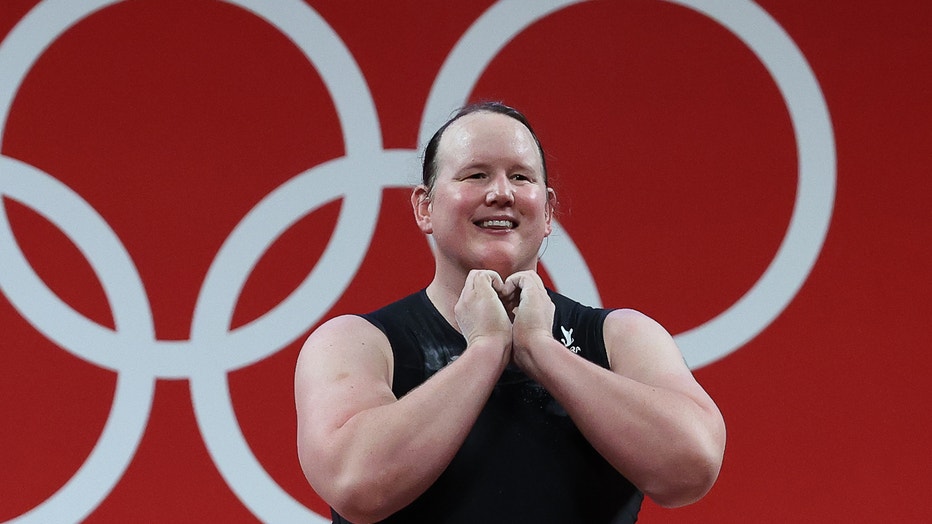Transgender weightlifter Laurel Hubbard makes history at Olympics
TOKYO (AP) - Transgender weightlifter Laurel Hubbard finally got to compete at the Tokyo Olympics.
It didn't last long, but it was significant. Hubbard couldn’t complete any of her first three lifts on Monday night, ruling her out of medal contention in the women’s over-87-kilogram division that ultimately was won by China's Li Wenwen.
Hubbard made a heart gesture to the audience with her hands before leaving the competition arena.

TOKYO, JAPAN - AUGUST 2, 2021: New Zealand's Laurel Hubbard competes in the women's +87kg group A final weightlifting event during the 2020 Summer Olympic Games at the Tokyo International Forum. Laurel Hubbard is the first transgender woman to compet
Even without completing a lift, she was a pioneer for transgender athletes.
While the New Zealander isn't the only transgender athlete competing at the Tokyo Games, she has been out for years and has been the focus of attention as a medal contender in weightlifting.
"Of course, I’m not entirely unaware of the controversy which surrounds my participation in these Games," Hubbard said after exiting the competition. "And, as such, I’d particularly like to thank the IOC, for, I think, really affirming their commitment to the principles of Olympism, and establishing that sport is something for all people. It is inclusive. It is accessible."
RELATED: Transgender weightlifter selected to compete at Tokyo Olympics
Hubbard also thanked the International Weightlifting Federation, because "they too have shown that weightlifting is an activity that’s open to all of the people in the world," and the people of Japan for hosting the Games under extraordinary circumstances during the COVID-19 pandemic.
Hubbard received applause and also applauded her fellow athletes when they were introduced on stage. Returning to compete, she took a moment to close her eyes, smile and take a deep breath. She overbalanced on her opening weight of 120 kilograms, taking the bar behind her shoulders.
Her second effort of 125 kilograms was ruled invalid on a majority decision by the referees. With New Zealand teammates and staff calling out encouragement, the third attempt was almost a repeat of the first.
Athletes are eliminated if they do not record at least one valid lift in each of the two parts of the competition.
Li's victory gave China its seventh gold medal in weightlifting at the Tokyo Games, and her rivals never got close. Li's total of 320 kilograms was 37 kilograms more than that of Emily Campbell, who became the first British woman to win a weightlifting medal.
Sarah Robles of the United States repeated her bronze from 2016 with 282. She was challenging for silver, but had her last lift ruled invalid for elbow movement.
RELATED: US shot putter Raven Saunders makes 'X' in podium pose after winning silver
The International Olympic Committee in 2015 drew up a set of recommendations for including transgender athletes. Many sports bodies, including the IWF, have implemented similar policies based on those recommendations. Different sports are allowed to set their own specific policies.
In weightlifting, that includes a requirement for athletes to show their testosterone is below a certain level after transitioning, a requirement which Hubbard met.
The IOC will release a new "framework" for transgender athletes’ eligibility in the coming months. That document is expected to take into account newer scientific studies published since the last major review in 2015. That will form a basis for sports to draw up their own updated policies.
Earlier Monday, Wang Zhouyu won the women’s 87-kilogram category to give China it's sixth gold medal in weightlifting. Wang won with a total of 270 kilograms. Tamara Salazar won the silver for Ecuador with a total 263, and Crismery Santana took the bronze with 256 for the Dominican Republic.

